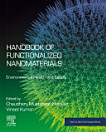The Climate Change-Agricultural-Environmental Nexus
About this ebook
Features:
- Provides detailed insights into the recent developments of greenhouse gas emissions and mitigation strategies
- Discusses topics related to climate and the Sustainable Development Goals
- Includes case studies of best practices as well as gaps and lessons learnt in relation to agroecosystems
- Offers practical solutions and actionable recommendations for addressing climate change and managing the environmental nexus effectively
This book is aimed at graduate students and researchers in environmental engineering, climate change, and agricultural sciences.
About the author
Sandeep Kumar Malyan is an Environmental Sciences researcher working in greenhouse gas mitigation. He joined Assistant Professor, Department of Environmental Studies, Dyal Singh Evening College, Lodi Road, University of Delhi. He previously served as Post-Doctoral Fellow, at the Institute of Soil, Water and Environmental Sciences, Agricultural Research Organization (ARO), Volcani Center, Rishon LeZion-7505101, Israel, and obtained his M.Sc. and Ph.D. in Environmental Sciences from Chaudhary Charan Singh University, Meerut and Indian Agricultural Research Institute, New Delhi respectively. He is involved in nature-based solutions for greenhouse gas emission mitigation and wastewater treatment research activity. Malyan has published 67 scientific papers in reputed journals with h-index-32 and i10-index-49. He receives the Bi-lateral ARO-Postdoctoral Fellowship-India and China from the Ministry of Agricultural and Rural Development, State of Israel, and a Junior Research Fellowship from the University Grant Commission, New Delhi, India.
Amit Kumar is an Environmental Scientist with more than 13 years of experience in climate change, environment science, and eco-physiology. His research interest includes quantifying greenhouse gases to environmental, soil, fertilizer, and management change and assessment of regional carbon and water budgeting and incorporating emerging capabilities of GHG mitigation & adaptation studies of agroecosystem and ecology. Field experiments are conducted to examine the response of crops to atmospheric CO2, CH4, and water on carbon, water, and energy exchange. Mechanistic understanding of these investigations is incorporated into models and used to assess ecosystem-scale responses to regional & global climatic change. Studies are being expanded to consider how low-carbon technologies can be used and interpreted within an ecological context; what new approaches can be used to model hierarchical systems in rice-wheat ecology; and how sensors and sensor networks can best be used for high-resolution measurements in the ecological sciences. His efforts at flux monitoring for agro-ecosystem are linked to assessing the impact of climate change on production and water use, and to mitigating and adapting to climate change and appropriate management of carbon, water, and nitrogen cycles in agro-ecosystem, which is needed for sustainable agriculture/sericulture under climate change. Furthermore, He has published more than 60 research/review articles, 09 books, 35 book chapters, and 03 technical bulletins. He has completed 14 training courses relevant to the agricultural ecosystem and its environmental management. Remote Sensing and GIS are also covered successfully. He also received many prestigious awards and recognition. He is a member of many professional societies and an expert panel member of important national and international organizations.
Ram Kishor Fagodiya is an Environmental Scientist having more than 8-year experience in the field of climate change and agriculture. His research areas of interest are greenhouse gas emission and mitigation from agricultural soils, conservation agriculture, and salt-affected soils. He joined Scientist (Env. Sciences), Department of Soil and Crop Management, ICAR-Central Soil Salinity Research Institute, Karnal, Haryana. He obtained his M.Sc. and Ph.D. in Environmental Sciences from Indian Agricultural Research Institute, New Delhi. He is actively involved in Conservation Agriculture, greenhouse gas emissions, and mitigation from Agricultural soils. Fagodiya has published about 30 scientific papers in reputed journals with h-index-22 and i10-index-27. He is a recipient of a Junior Research Fellowship by the Indian Council of Agricultural Research (ICAR), University Grant Commission (UGC), Council of Scientific and Industrial Research (CSIR), New Delhi, and Department of Science and Technology (DST)New Delhi, India. He is a member of several professional societies and scientific journals.
Vineet Kumar works as a Postdoctoral Research Associate, under DBT-Research Associateship (DBT-RA) Program (Ministry of Science and Technology), in the Department of Microbiology, School of Life Sciences at the Central University of Rajasthan, India. He holds M.Sc. and M.Phil. in Microbiology from Ch. Charan Singh University, Meerut, India. and Ph.D. (2018) in Environmental Microbiology from Babasaheb Bhimrao Ambedkar (A Central) University, Lucknow, India. Dr. Kumar’s research work has been mainly dedicated to wastewater treatment and solid waste management, focused on valorization of agro‐industrial wastes for bioenergy production and development of sustainable approaches to mitigate environmental impact of refractory pollutants of discharged in wastewater and sludge. As a National Postdoctoral Fellow (N-PDF), he worked on role of biofilm forming microbial community in situ and ex-situ remediation of pulp-paper mill waste. Dr. Kumar has published more than 63 articles in peer-reviewed international journals of repute, 24 books, and 58 book chapters, on various aspects of science and engineering, with more than citations of 4300, and h-index 39 (Google Scholar). Dr. Kumar has been serving as a guest editor and reviewer in more than 82 prestigious International Journals. He has received prestigious fellowships including the Rajiv Gandhi National Fellowship by University Grants and Commission (UGC); the National Postdoctoral Fellowship by the Science and Engineering Research Board (SERB), Department of Science and Technology (DST), DBT Fellowship under DBT-Research Associateship Program of Department of Biotechnology, Ministry of Science and Technology, Government of India, demonstrating his commitment to environmental research and education. He has been recognized among the top 2% of scientist worldwide from 2023 by Stanford University. He can be reached at [email protected]; [email protected].







